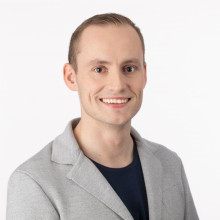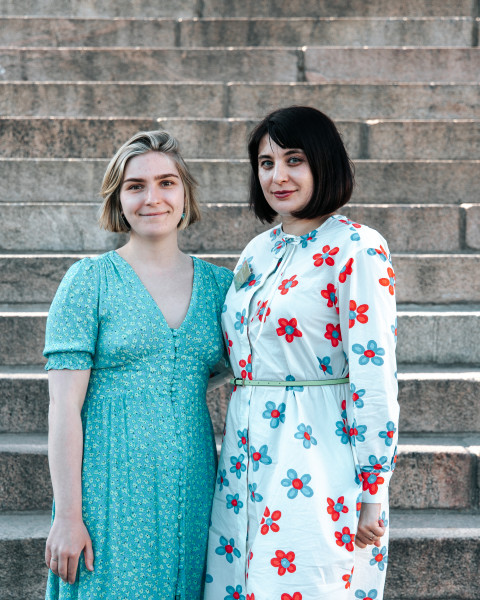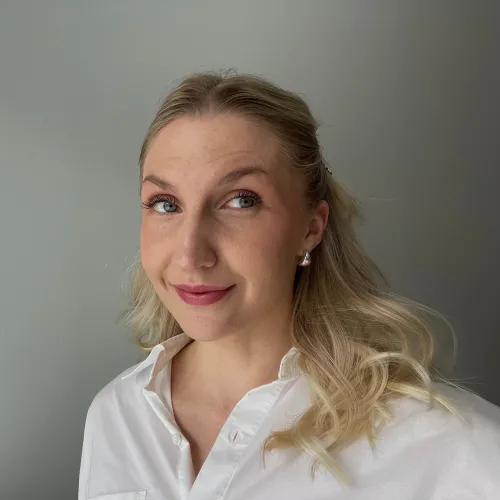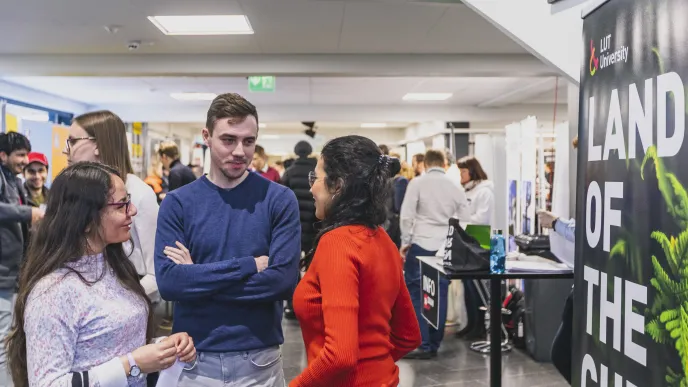In the LUT University mentoring programme, alumni and students work closely together. Mentors provide students (mentees) with valuable support in various work-related topics and in recognizing their own skills. The programme is aimed at LUT's master's and doctoral students, as well as alumni with more than five years of work experience.
Mentoring pairs Paavo Tertsunen and Emma Pukki as well as Olga Kryuchkova and Lisa Tereshchenko recommend the programme to anyone motivated to develop their own skills and readiness for working life.
"The most important thing is an open dialogue, where both of us listen and talk"
Emma Pukki, master's student in chemical engineering, wanted to gain a new perspective on career planning through mentoring.
"I felt I needed an external viewpoint on how to plan and shape my career development," Pukki says.
Her mentor, Paavo Tertsunen, is an environmental engineering alum and works as a preparedness specialist at the National Emergency Supply Agency. Tertsunen has worked extensively in various roles, which was also beneficial in mentoring.
"My background is multidisciplinary, so it has been important for me to help my mentee find her own path, whether it aligns with her degree programme and major or not," Tertsunen summarizes.
Pukki and Tertsunen had many discussions during their mentoring meetings, both playing an important and active role. They talked openly about goals and expectations from the very beginning.
"The most important thing is an open climate for dialogue, where both of us listen and talk. Trust is built through equal dialogue because a mentor cannot solve anything on behalf of the mentee or offer ready-made solutions," Tertsunen emphasizes.
"The discussions we had brought many new insights into various matters. If my mentor challenged my viewpoints, it made me think about them even more thoroughly, which helped refine my thoughts further," Pukki continues.
When asked about the most memorable moment of the programme, both Pukki and Tertsunen named the same thing: a visit to Tertsunen's workplace.
"I visited my mentor's workplace and got to participate in planning the day's programme. During the visit, I met many new people," Pukki explains.
The mentoring programme focuses more on the mentees, and Tertsunen emphasizes that is important for mentors to provide "a little something extra" alongside regular mentoring meetings whenever possible. Pukki and Tertsunen recommend mentoring but also remind of the importance of motivation and commitment.
"Mentoring can also give a lot to the mentor, but you need to find your own motivation to gain new perspectives and learnings from the programme. I think mentoring is most beneficial when the two people have a positive mutual dynamic and agree from to the start on what to expect," Tertsunen concludes.

LUT Mentoring Programme
Master's or doctoral student, the mentee application period will start in October 2024, so mark it in your calendar. More detailed information and schedules can be found on the mentoring website.

"My mentor was able to support me in the right way because she had been in a similar situation before"
Doctoral student in information technology Lisa Tereshchenko and her mentor Olga Kryuchkova found common ground during their first meeting.
"We talked a lot during the first meeting and got to know each other at a relaxed pace to build trust and lay the foundation for collaboration," says Tereshchenko.
"It was exciting to see that we found similarities in each other even in the first meeting," Kryuchkova adds.
Kryuchkova is an industrial management alum and works as a consultant at the Finnish Labour Archives and in expert roles at the Adult Education Center of South Karelia.
Tereshchenko has about a year and a half left in her doctoral studies, so graduation is slowly approaching. The Mentoring Programme provided her with the opportunity to explore employment opportunities in her field.
"My goal was to learn about the job opportunities available to me outside of an academic career. My mentor helped me better understand the field and the job market in Finland. She was able to support me in the right way because she had been in a similar situation before," Tereshchenko notes.
They proceeded towards the goal not only with diverse discussions but also by mapping out the starting point and making several plans for the future.
"We built a strategy based on the initial situation and created a plan for how to move forward," Kryuchkova summarizes.
However, the collaboration was not too serious.
"We often met over lunch or coffee, which helped create a relaxed and open atmosphere. Face-to-face meetings also deepened our mentoring relationship," Tereshchenko says.
Both recommend participating in the mentoring programme, as it expands perspectives and teaches new things to both the mentee and the mentor. Additionally, a longer-term relationship may develop from the mentoring.
"The collaboration has been beneficial for both parties: I learned as much from my mentee as she did from me," Kryuchkova rejoices.
"The best part is that we became friends during the mentoring," Tereshchenko mentions.
More information

Anni Hänninen





